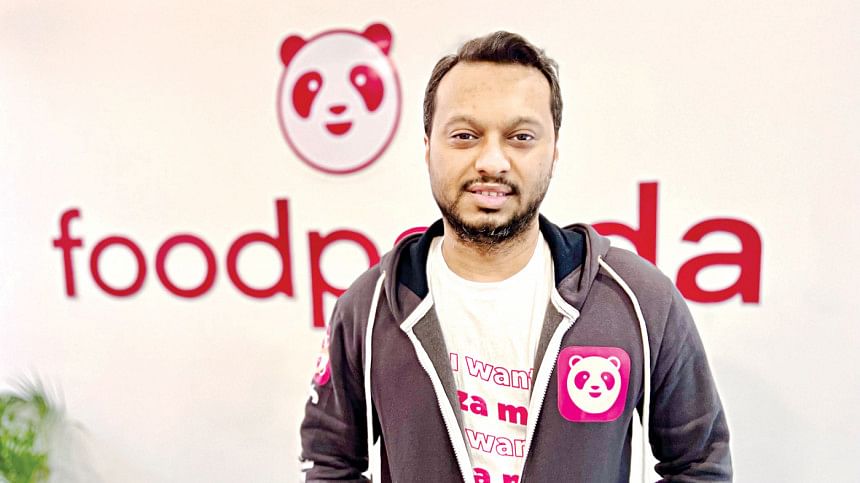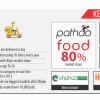Foodpanda looks to tap growth opportunities

Foodpanda was launched in Bangladesh in early 2014 and was acquired by Berlin-based Delivery Hero in late 2016. Soon, it overtook other food delivery platforms in the country to climb up to the top position
When the coronavirus pandemic hit Bangladesh in 2020, food delivery platform foodpanda accelerated its expansion to establish its footprint across the country as demand rose.
By the second week of December 2020, it had operations in all 64 districts in the country.
Foodpanda started off in many parts even without physically travelling there. Restaurant signups were done through calls and teams were hired remotely.
Not only Foodpanda, but the entire food delivery industry in the country was also turbocharged by the crisis as people had to work, study and find entertainment at home.
And Zubair Siddiky, co-founder and managing director of foodpanda Bangladesh, says the expansion process was just the beginning.
"Although we have come a long way from there, we are still at an early stage because there are immense growth opportunities," he said in an interview with The Daily Star.
Foodpanda was launched in Bangladesh in early 2014 and was acquired by Berlin-based Delivery Hero in late 2016. Soon, it overtook other food delivery platforms in the country to climb up to the top position.
There were two driving factors: first, it was part of the strategic plans of the company to expand and cover as much of the population as possible, and second, the pandemic has generated the demand for such services.
"The opportunity there was just too large to overlook," Siddiky said.
"The pandemic, of course, made it a bit difficult logistically, but we saw it as an opportunity as customer adoption in the segment was faster during the pandemic."
In order to become the top food delivery platform, foodpanda has invested heavily in the distribution of tablets.
It supplies the tablet, which is used to take orders when it onboards a restaurant as it helps streamline the process.
Of the restaurants and shops that have currently signed up with foodpanda, about 24,000-25,000 are equipped with the devices.
"We don't pass orders manually as we want to avoid inaccuracies and mistakes. When a customer makes an order via a phone call, we need to pass the order to a restaurant. But this creates a scope for making mistakes."
Using the tablets, restaurants can themselves see the order and even take printouts.
"We have completely automated the process," Siddiky said.
Each tablet costs between Tk 10,000 to Tk 15,000. "It is a big expenditure for us," said Siddiky.
He declined to disclose the number of deliveries the platform processes each day, calling the data confidential.
"As foodpanda operates across competitive markets, such data can be used by others to make any calculations."
Foodpanda launched pandamart, also an online platform, at the end of 2020, with an aim to deliver groceries and daily essentials at the doorsteps of customers within 30 minutes.
The idea came up as people found it difficult to come out of their houses for groceries owing to the risk of catching the virus and lockdowns.
"So, we grabbed the opportunity and partnered with major groceries," said Siddiky, who studied economics at the North South University.
After the rollout, pandamart faced some challenges since it could not track the inventory live. As a result, customer experience was not at its best since many did not receive their desired products after ordering.
This led the company to introduce dark stores, or warehouses, which gave pandamart complete control over inventory. This also increased its control over the supply chain.
Subsequently, customer experience improved. "The delivery time has been brought down to 20 minutes to 30 minutes," Siddiky said.
Currently, pandamart runs its operations through 32 warehouses in 16 districts, including the capital city and plans to expand further.
Siddiky thinks the food and groceries market is under-penetrated in Bangladesh.
"The food and groceries market size can be valued at $9-10 billion. The online industry has not had even 2-3 per cent penetration."
The young entrepreneur describes Bangladesh as a very good market in terms of profitability.
"We are on a path toward profitability. If we can't make a profit, the business will not be sustainable."
"If we constantly keep burning money, we will run the risk of losing investment. We need to prove that we are on our way to building a sustainable business, and we are doing just that."
Siddiky says if there are constant complaints against a particular restaurant, it intervenes and takes action.
"The percentage of mistakes is very low on our platform. We have a large team to ensure absolute minimisation of mistakes."
Foodpanda has a dedicated team to train restaurants, both online and offline.
"We do what we can to avoid our customers having a negative experience. If necessary, we may also delist restaurants from our platform."
Siddiky alleges that there were instances where customers harassed riders.
"In such cases, we have blocked the customers and taken appropriate legal actions."
He refuted complaints that foodpanda takes a hefty commission from restaurant owners, saying the average commission rate is low.
"Other companies, around the world, charge a higher rate than we do in Bangladesh. Even in the Indian market, aggregators charge a higher commission than us on average."
For a food delivery aggregator, a commission below 25-30 per cent leads to the unsustainability of the business, he added.
In order to ensure the safety of riders, foodpanda trains them on safety issues while onboarding them. It has insurance that covers their treatment cost.
"Women, transgenders and even differently-abled individuals are working as foodpanda riders," Siddiky said.
He also shared his thoughts about the ongoing debate on the benefits and rights of the gig economy workers.
"Considering the nature of the job, we provide them with the opportunity to work whenever they want. We don't force them to work a certain number of days. We give them the freedom and flexibility to choose when they want to work."
"This independence is an amazing part of the gig economy. Alongside this, we are always working to provide an equal and safe working environment to everyone."
Foodpanda has invested heavily in logistics, making the system one of the best.
Currently, the company has more than 800 full-time employees as well as many contractual workers. In total, it employs over 1,000 people.
"We are also generating many jobs and income opportunities outside the office," Siddiky said.
There is indirect job creation as well. For example, restaurants are also generating employment opportunities thanks to the additional orders from online platforms.
"We play an important role in income generation and we will keep playing the role as we move forward," Siddiky said.

 For all latest news, follow The Daily Star's Google News channel.
For all latest news, follow The Daily Star's Google News channel. 





Comments